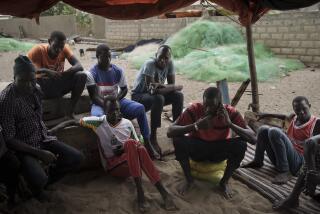Documentary : Africa Quest: We’re Off to See the Khalif : If you want to interview the leader of a Senegalese Muslim sect, getting there is half the agony. One learns to plan grand and settle modest--and bribery helps.
- Share via
TOUBA, Senegal — “You want to see the khalif. I myself can arrange it.”
Sweet words indeed. I had been in Senegal for some time working on an article about the Mourides, the Islamic sect that dominates the country’s politics and economy. An audience with the Khalif-General, the recently installed Mouride sheik and son of the charismatic founder Amadou Bamba himself, would be indispensable.
But it would not be easy. The new khalif, like his predecessors, does not even speak French, the official language of Senegal, only the native tongue of Wolof. He is buffered by several layers of marabouts, or priests, most of whom represent their own clans of followers. How to breach the ceremonial wall around him?
One day a friend at an American foundation here remarked, almost in passing: “I don’t know if this will amount to anything, but we have someone here who says he can arrange a meeting with someone who can arrange a meeting with the khalif.”
A third-hand connection is better than many contacts in Africa, so I seized the opportunity. After three meetings with intermediaries, I was face to face in a bar with my putative guide, Pedre Ndaye, who claimed to be a retired rural magistrate. He swayed uncertainly, eyes rheumy and smile askew, cadging cigarettes from cronies as I gave him a skeptical once-over.
He and the khalif had been schoolmates, he said. From the fold of his dog-eared driver’s license he extracted a 30-year-old snapshot. He and the khalif were certainly standing next to one another, but were they “together”? From the dim blur of the old picture it was impossible to say.
In Africa, one learns to plan grand and settle modest. Good stories beckon promisingly in the mist, forever out of reach because crucial sources cannot be identified or located, or travel to remote spots cannot be arranged. One learns to budget for disaster in places like Nigeria, where one gets a seat on a domestic flight by beating other passengers to the plane at a dead run. Sudan used to boast some of Africa’s most accessible officials and politicians, but since a coup put old sources in prison last year, reporting has been complicated. Throughout Africa, telephones are unreliable, roads are deadly, airline schedules non-existent.
So while I dreamed of a comfortable chat with the khalif, a relaxed disquisition on the niceties of Mouride theology, spiced with piquant observations about the home life of the sainted founder recalled from the khalif’s infant days, I was, more than ever, prepared for much less.
Ndaye was optimistic. “He will talk about anything you want,” he said. He offered to go to Touba, the Mouride holy city, over the weekend on a scouting trip. There followed a discourse on the expense of traveling, the fatigue of the trip and so on. The point was clear.
“Cinq milles francs? “ I asked. “Bon, “ Ndaye replied, palming a 5,000-franc bill worth a little more than $20.
Meanwhile, I pursued other potential--and I hoped more sober--contacts. But by Monday, characteristically, they had all fallen through. Back from his scouting mission, Ndaye explained that the pilgrimage to Touba would encompass several intermediate stops in order to provide a full education in the Mouride way. First would be the house where the founder slept on the last night of his life, then the first mosque he built, the house he lived in before exile, and so on. It was like the Stations of the Cross.
There was a final discussion of his weekend trip. The dust and the buses and the traveling late at night. . . .
“Another cinq milles? “ I asked.
Ndaye looked sadly at the tablecloth. “Dix. “ I passed over a 10,000-franc note.
At 8 the next morning, right on schedule, he reported to my hotel. He and my driver, a young Mouride named Oumar Gueye, who has three wives and 16 children, were both dressed for the occasion in their best anango-- flowing blue robes with embroidered gold collars.
Ndaye sustained a commentary of repetitious Mouride lore through the entire three-hour drive. He touched on most of the well-known legends surrounding the life of Amadou Bamba, who was twice exiled from old Senegal by nervous French colonialists and whose death in 1927 set off an explosion of Mouride growth based upon his teachings of nonviolence and the piety of labor.
At each landmark, Ndaye paid his obeisances to the appropriate custodian and slipped him one of my 1,000-franc notes. Every site had a handsome mosque with whitewashed walls and exquisite plasterwork and tiles. The sand of every courtyard retained the imprints of a thousand barefoot pilgrims following the same route we had taken. For offerings, tin boxes with coin slots in the top and padlocks on the front were obtrusively placed everywhere.
Finally we reached the khalif’s headquarters at Touba, where there was much shaking of heads and commiserations in Wolof. The khalif, it seemed, had gone for the day to Colobane, his family compound. Ndaye was crestfallen, but only for a moment. “We’ll just go there,” he said equably.
Colobane was some miles away at the end of a road newly blacktopped by a Senegalese government mindful of the Mourides’ political authority in the countryside. A turnoff onto a sandy alley, and we found ourselves amid an immense gathering of Mouride disciples. Hundreds sat in a glade chanting Amadou Bamba’s poetry, led by a voice coming from a set of shrill loudspeakers.
Ndaye negotiated briefly in Wolof, and we were shown through a corrugated metal doorway to a courtyard facing the khalif’s house. In one corner, three gendarme-bodyguards lolled on wooden chairs. Shoes off, we took our places on mats in the sun.
There followed a standard African stage pause. In its indeterminate grip one becomes so stupefied by sheer torpor that any surge of activity is welcomed as a herald of progress. Someone came out to lay out a couple of reed mats. Someone else took them away. An hour passed.
Presently we were led to a second yard. I paused, shoes in hand. A mule brayed from his tether next to two scrofulous horses. Long use had turned the ground here into a medley of hay, gravel and manure. On tiptoes I crossed to a gazebo where the gendarmes were now installed, eating lunch, and as I sat picking pellets of manure and pins of hay from my socks, Ndaye casually remarked, “Oh, you should have kept your shoes on.”
A Senegalese-style lunch arrived: a bowl of greasy rice and pieces of meat eaten communally with our hands. Time dragged. Ndaye’s habit of prefacing his observations by picking at my sleeve and clutching my shoulder had long since exhausted its charm.
Ndaye seemed to know a lot of people in the courtyard, but it was impossible to say which, if any of them, had any real authority.
“What was that all about?” I asked as another man came out to exchange pleasantries in Wolof with Ndaye. He made a patient gesture. “One has to wait a little,” he said.
To an experienced African traveler, these words are chilling. How many hours of fruitless waiting in visa offices, airport lounges, information ministries, police stations, had been preceded by this phrase of serene reassurance? I began to figure out what time we would have to leave Colobane, audience or not, in order to be off the deathtrap Dakar road before nightfall.
But incredibly at that moment, a white-gowned attendant motioned our small group forward.
Another courtyard, another door, and we were in a concrete room with no furniture but a single chair. In the gloom there was a shuffle of feet. A forest of disembodied hands seemed to be maneuvering me incomprehensibly into position.
Finally we were all arranged properly on the floor, and the khalif entered.
He was a tiny man in a white robe and orange scarf. Thick black glasses and a trim gray goatee framed his light-skinned face, which bore an amused smile. A score of attendants watched him settle into the chair.
At Ndaye’s importuning, I had handed over to him 1,000 francs to give the khalif as a gift. Ndaye and the driver bent their heads and offered their hands to the khalif, who gripped them and deftly extracted the bills with his fingers, slipping them to an acolyte at his side. Appalled, I realized that Ndaye had left me temporarily empty-handed. As the khalif lightly took my own hand, I had the fleeting impression of fingers disconsolately probing my bare palm. But the khalif kept smiling.
From this point on, Ndaye melted into the background. It was Gueye who took up the slack, greeting the khalif with an elaborate formula in Wolof. He told me later that he had explained my mission by saying I was a visitor from Los Angeles who had dreamed of nothing but to meet the khalif and to pose certain questions about the role of Mourides in Senegalese life. The khalif responded with a short Wolof phrase, and Ndaye and Gueye turned to me to say I could now ask my first question.
In the intimidating atmosphere, electric with haste, I bade a last farewell to any expectations of a real interview with this khalif. I stammered out a question in French about whether the brotherhood was changing with the shift of population from the traditional rural life to the cities.
Gueye translated, and the khalif responded briefly with the air of polite condescension with which any Mouride marabout treats his disciples. I got away two more questions, at the end of which the khalif, still looking amused, half-rose from the chair to signal that the audience was over. The smiling throng of attendants gently maneuvered me to my feet and toward the door. I proffered my hand again, and this time the khalif’s fingers extracted a 1,000-franc bill. He smiled, and there was an approving murmur from the acolytes in the room.
More to Read
Sign up for The Wild
We’ll help you find the best places to hike, bike and run, as well as the perfect silent spots for meditation and yoga.
You may occasionally receive promotional content from the Los Angeles Times.






